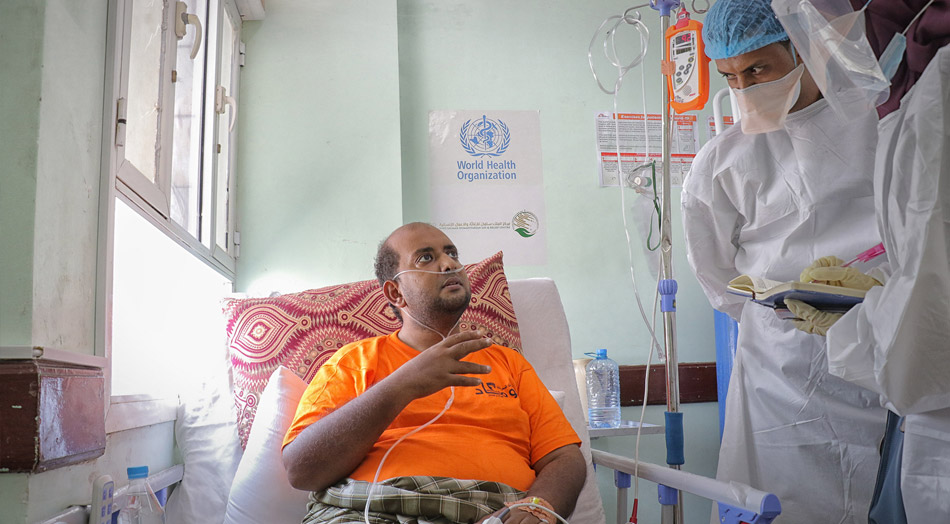
14 July 2021 – In the midst of a humanitarian crisis and a health system debilitated by years of conflict, incessant epidemics and the recent COVID-19 pandemic aggravating the situation further. WHO and the King Salman Humanitarian Aid and Relief Centre (KSrelief) are working together to fill critical gaps and strengthen preparedness and response to COVID-19 and other public health concerns.
Sameh is a father of 3 children – 2 girls and a boy. He works in Al Sadaqqah hospital’s intensive care unit (ICU). Al Sadaqqah is one of the largest hospitals supported by WHO and KSrelief in Aden. When Sameh was infected with COVID-19 around 2 months ago, he stayed home hoping to feel better but his condition worsened and he was rushed to the ICU due to difficulty breathing.
“My health situation was dire. I was kept in the intensive care unit for a week.” He says while out of breath. “I’ve been receiving treatment, monitored oxygen supply and care here at the ICU for 3 weeks now. I feel much better and the doctors report that I’m doing well. But I still need to get regulated supply of oxygen as directed by the doctor,” adds Sameh.
Health care workers in the frontlines of COVID-19 and other diseases are risking their lives daily. And in Yemen, they face compounded challenges due to the damaged infrastructure and socioeconomic difficulties. Yet they continue to work under dire circumstances.
Sameh is one of 2560 people being treated for COVID-19. “The health staff are treating me so well. I would like to extend my thanks to KSrelief for providing this service and all the services they continue to provide in such a critical time. I am grateful I am now better and that I will soon be able to be discharged,” says Sameh.
Partnership to mitigate risks and save lives
To reduce occurrence of infection and to minimize morbidity and mortality of COVID-19 WHO and KSrelief are working to advance pandemic preparedness, early detection of COVID-19, as well as through mounting appropriate control and public health containment measures. The large-scale support includes building local capacity at the ICU level, providing oxygen and essential medical and nonmedical supplies. In addition to supporting the national referral laboratory capacity through provision of equipment and essential supplies, as well as training laboratory staff.
Through this project, 173 health care workers have been trained including 70 laboratory staff in order to build capacity in 14 supported ICUs and 12 supported laboratories. This has made treating 2560 COVID-19 patients possible in WHO and KSrelief-supported facilities between January and June 2021.


